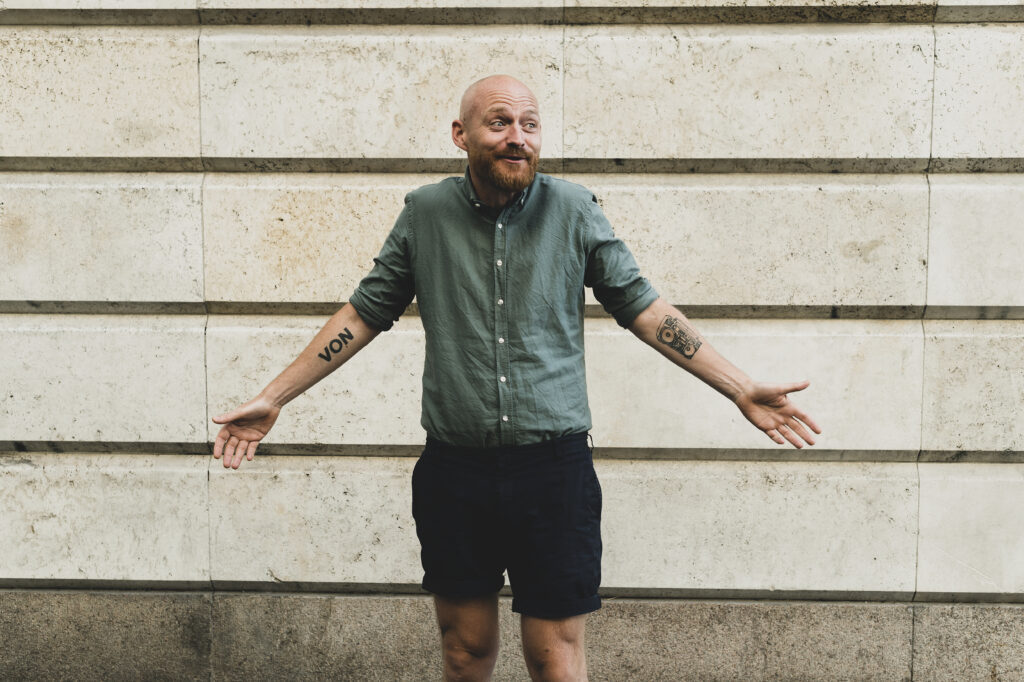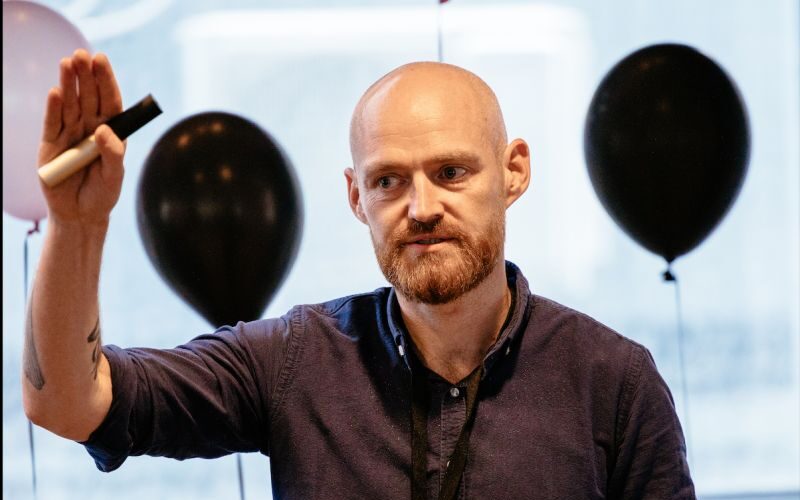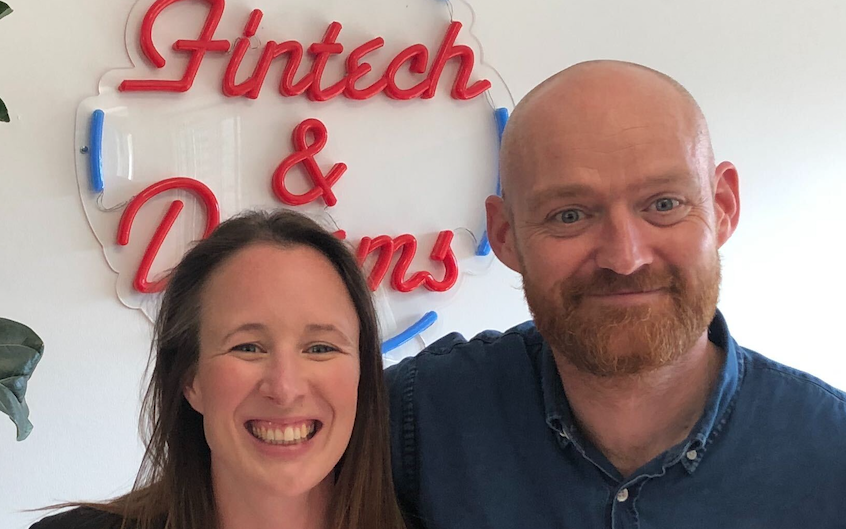“I have a tendency to be ahead the curve. Commercially, that might not be the best thing. But it seems like reality is finally catching up where I am headspace-wise.”
This article is part of a series of ‘Chat with a FoTer’ where we sit down with FoT alumni to discuss the amazing things they do.
At the time of the interview, Thomas Bisballe, Founders of Tomorrow 2019 alumnus, is sitting at his home in Copenhagen. I met him for afternoon tea over Zoom to talk about the journey of IMPACTR – his startup that will launch their first product in a short while. I was curious about his adventures in the world of social entrepreneurship and what he brought home from Founders of Tomorrow.

Hey Thomas! How’s your day been so far?
I’ve spent the whole afternoon talking to investors in an online investors’ matchmaking event by TechBBQ. I had some really good meetings. These days, my days consist of a lot of Zoom calls. Especially since my co-founders Johannah (Maher) has been in Australia for the past seven months, and Majken (Witt) is spending a lot of time in Paris. We kind of have our shop open 24/7 now.
Oh wow! You are really all over! But before we jump into what you are working on right now, I want to start out with you. When applying to Founders of Tomorrow in 2019, you described yourself as “Jack of many trades” being a scholar, public sector innovator, entrepreneur, investor and musician. You also said that “I often feel like was born in the wrong generation.” Do you still feel like that? And if yes, why?
Yes, I do, very much so. I have a tendency to be ahead the curve. Commercially, that might not be the best thing. But it seems like reality is finally catching up where I am headspace-wise.
I’ve always done things that are related to one-another but that are in different worlds. I researched social entrepreneurship, got really interested in the business side and did a deep dive into that. While working with social entrepreneurs, I got really interested in the investment space that lead me to Oxford University to do a course on impact investment on a scholarship. That led me to starting to investing in stocks and figuring out how to start investing in startups.
My first investment was in a music start-up company called WARM (World Airplay Radio Monitor). I just closed my eyes and jumped into being a very hands-on investor.
What got you interested in social entrepreneurship in the first place?
My mom was a social entrepreneur and I started my first social enterprise at the age of seven. We’d lived in India for a couple of years and when we moved back to Denmark, I started collecting toys and sending them to my friends in India. It was a one-off thing, though.
Actually, for a long time, I thought I was a person who only liked starting things or facilitate other do’ers. That execution was not my thing. But I’ve realised that that’s not really the case. I think it was part of some kind of an impostor syndrome I had. Now I know that I’m both practical and nerdy about things, but I still perceive myself as being a bit lazy if I’m not fully vested in what I do.
What were you doing at the time you joined Founders of Tomorrow in February 2019?
I just crashed trying to develop and fundraise for a start-up studio while working in the impact and sustainability field as an independent consultant. I was actually considering completely leaving the field and join WARM fulltime. The impact and sustainability field felt like an industrial complex where no one was really doing anything that really mattered systemically.
I’d actually forgotten that I’d applied for the Founders of Tomorrow program when I got an email that I was accepted.
How was it? What did you get out of it?
I went to Founders of Tomorrow and got energized. It really showed me that things could be different. There was a whole new set of people out there. It gave me the feeling that only sky is the limit.
FoT also gave me an understanding of how I can research tech. One of the deep insights I got is to trust my intuition. Especially the talk by Nikolaj Sorgenfrei Blom on quantum biology and following one’s intuition made a deep impression on me.
I was part of a great team at FoT but our pitch was not that developed. The idea we pitched was a sustainability super app that would work as an infrastructure that others could plug their solutions into. We didn’t manage to get that far in developing the idea during the five days at FoT. But some of the concepts from that idea ended up in IMPACTR.
And the talk by Anders Hvid on Exponential Organisations also stuck with me. Especially when he talked about how you can run and scale a business by having resources available in a more flexible manner. I can see now that we are doing many of the things, like how we work remotely and distributed and how we hire in talent and engage our community. For example, we recently had a super specialised agency doing market research for us for two months. We would’ve never been able to hire such resources on a permanent basis at this point.

What happened after FoT?
The week after FoT, I had a meeting scheduled with Johannah (my now-co-founder). She was looking for someone to join her team working on a financial marketplace for sustainability. My intention was to go and do a bit of mansplaining on how they were too early and that their idea would not work. But instead, she hit me with data. Our coffee turned into a three-hour meeting. And we really clicked. Johannah convinced me that the time was right, and I had the feeling that the technology was on its way. A week after, I called my clients and told them that I’d be finishing off any remaining tasks but then I’d be out.
What I brought to IMPACTR was the basic idea that was featured in my team’s idea at Founders of Tomorrow. It was the API (application programming interface) based model where we wanted to build an infrastructure or platform that could mobilize the needed community and then integrate different tech into it through partnerships.
What a story! What happened next?
We spent a few months figuring out what to do. We concluded we wanted to create a social media marketplace. And then we pivoted into a social media with an embedded marketplace. IMPACTR went live in September 2019 and launched an MVP (minimum viable product) in January 2020.
The MVP was downloaded in 80 countries. It gave us a chance to talk to actual users. We realised we had to add features that don’t really exist in the current landscape. That we needed video to be the focal point. So, we decided to focus on creating an experience that would speak to sustainability influencers posting inspiring videos for their communities.
So, what exactly is IMPACTR? And what is your business model?
It’s a video sharing app that makes social and environmental action easy. In IMPACTR, small actions done collectively can create tipping points for big impact! For example, only 7% of all pension funds in Australia would be needed to fund the country’s green transition. And at the same time, research shows that 80% of people want to live more sustainably but only 10% actually get to it. We can see people are longing for guidance on what to do. And since we want to target young people, social media is the way to go.
We combine fun tech with an impact backend. It’s like TikTok for sustainability.
We have a network of 300+ sustainability experts that can create campaigns. The experts identify tipping points or endorse certain brands. The influencers can choose if they want to support and promote them. This way, we make sure that every action is sustainable, and every post can be linked to a concrete action.
Our initial business model is built on affiliate partnerships with sustainable consumer brands. They pay by conversation or clicks. We joined the Copenhagen Fintech Lab this winter and mapped out fintech elements to support the evolution of our business model and product roadmap.
Wow, sounds truly inspiring! What have been some of the biggest ‘Ahaa!’ moments for you?
We in Northern Europe often think that we are exceptionally conscious about the sustainability. But both our market research and the feedback from the IMPACTR community, I can see that Generation Z (those born between mid-to-late 1990s and early 2010s) in the Global South and South East Asia are making big changes in their lifestyles.
My co-founder Johannah is amazing in getting people to jump onboard and finding people to work with. We have an amazing team of software developers based in Australia. They hire in undergrads to do both front and backend work. It’s really good to have young people onboard as we are not building a product for my age group. But I’ve also spent a lot of time in TikTok and other socials researching what triggers different user groups.

Sounds like IMPACTR is truly global!
We have people engaged all around the world. And have gotten so many videos and contact from Africa and can see things are moving fast over there. We thought first that maybe this would only be for privileged kids in our part of the world, but can now see that it is interesting for young people all over the world. They love being part of a global community.
People are really looking for a place to connect. We have already 3000+ followers on a site like LinkedIn without even having a product yet!
What’s next for IMPACTR?
We’ll launch the app in the AppStore and Google Play for a global market later this year. Be sure to sign up for that early bird access! 😉
All the best with the launch! Can’t wait to check it out and see the ripple effects!
